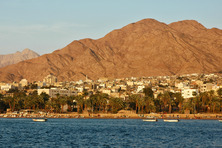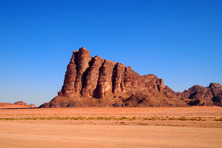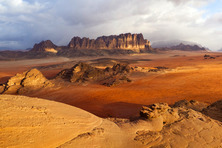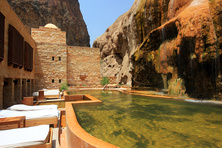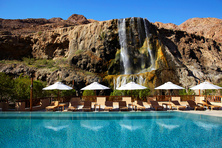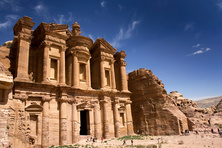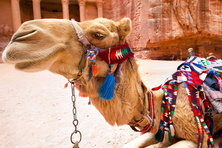Jordan
- Capital:Amman
- Currency: Jordanian dinar
- Time: UTC+2
- Languages: Arabic
- Religions: Islam (Sunni)
- Sections: Get in Visa Customs Cuisine Money Details of interest Popular resorts
Jordan or officially the Hashemite Kingdom of Jordan is a Middle East state part of which is washed by the Dead Sea and the waters of the Gulf of Aqaba. Jordan borders Saudi Arabia, Israel, Syria, Palestine, and Iraq. The capital city is Amman.
The climate in the country is predominantly desert tropical, but in the north-western regions, the climate is Mediterranean subtropical. The touristic season lasts throughout the year, but the best seasons for visiting the country are spring and autumn.
The official language in Jordan is Arabic, but people on the touristic resorts can speak English very well. The majority of the population practice Islam.
Jordan is usually chosen by the families and people who want to relax on clean and well-equipped beaches. Those who prefer the Red Sea prefer to stay in Aqaba and Tala Bay. For active tourists, there is everything and anything for diving, snorkelling, windsurfing, yachting, and water skiing.
The main destinations for a well-being tourism are the districts of Al Karak and Amman beach on the Dead Sea coast and the Ma’ in canyon with its hot springs.
Ecological tourists also choose Jordan, where they can enjoy nature and see the animals in the Mujib Nature Reserve and Dana Biosphere Reserve. They can see the untouched vast expanses of the Wadi Rum Desert.
Those who prefer to go sightseeing will see the monuments of history and architecture in Madaba Mount, Petra, Jerash, Azraq, and Ajloun and, of course, in the capital city.
Get in
By Plane
The citizens of Russian and Ukraine can take a direct flight from Moscow or Kiev to Amman offered by the Royal Jordanian three times a week. The citizens of other CIS countries will have to take a transit flight with a transfer in Istanbul, Vienna or Frankfurt. Royal Jordanian, Air France, and Austrian 853 offer direct flights from the large European Union cities.
By Sea
One can get to Jordan by sea from Egypt taking a ferry which runs between Nuweiba and Aqaba. The timetable of the ferry route often changes so it is better to buy the tickets beforehand.
By Land
There is a bus running from Nazareth (Israel) to Amman. If you stay in Arava, you can go to Jordan on foot. Two times a day, a regular bus runs from Damascus to Amman. The tourists can also take advantage of the services of private minibuses.
Visa
The EU and CIS travellers will have to obtain a visa to come to Jordan. The exception is the citizens of Moldova who can get a visa on arrival at any airport or checkpoint except the Israeli- Jordan crossing Allenby — King Hussein.
One can obtain a visa beforehand by submitting the documents to the Embassy of the country. It usually takes 3 working days to get a visa. A single entry visa is valid for 3 months from the date of issue and it allows the tourists stay in the country for a month.
Customs
The Customs legislation of Jordan does not restrict the import of foreign or national currency. However, any imported sum must be shown to the customs officers and declared.
The tourists are allowed to bring in the following things duty-free:
- personal clothes, accessories, shoes, and perfume;
- some alcohol and tobacco;
- souvenirs the total cost of which does not exceed 150 US dollars.
It is strictly prohibited to import:
- animals and birds (without an international vet certificate);
- antiquities (without a permission);
- psychotropic medications.
The tourists are not allowed to export:
- antiquities (without a sales receipt);
- more than 300 Jordanian dinars;
- unprocessed natural corals;
- stuffed animals and ivory.
Cuisine
The Jordanian cuisine combines Arabic cooking traditions and local cooking methods developed under the influence of the climate and the culture of neighbouring countries.
The main place on the table of the Jordanians is given to flatbread Kmazh and bread Ragyf. The staple food here is pea, eggplant and other vegetables, rice, and potatoes.
If you come to Jordan, you should try a local dish Shawarma (a mutton stew with rice and sour cream), Mansaf and Adas (chicken with lentils and onion and lemon sauce), roasted chicken Mussakhan and barbecued meat Mashawi.
The Jordanians often add lemons, pine nuts, mint and other herbs, olives and onion to their dishes.
If you stay on the sea resorts, you will have a chance to try rare for traditional Jordanian cuisine seafood dishes. The most popular is Sayadia (roasted fish with rice).
For a side dish, the tourists usually try Falafel, Theniya or Hummus and eggplant paste Muttabal.
The most spread first course is a thick soup Mulukhiyah with chicken or rabbit, rice, garlic, and lemon.
Traditionally, at the end of each meal, Oriental sweets are served. Treat yourself to a famous Baklava, pies with goat cheese stuffing Kochava, and milk-based pudding Mahalyabiya.
Typically, unsweetened coffee with cardamom or herbal tea are served with each meal. The tourists will find alcoholic drinks in all eateries and restaurants. Only during Ramadan, alcohol is not available. Take a chance to try the local beer, wines Saint George, Jordan River, and Mount Nebo. A traditional anise-based strong alcoholic drink Arak is served with ice or diluted with water.
Money
The official currency is the Jordanian Dinar (JOD) which is divided into 1.000 fulus or 100 piastres. The Central Bank of Jordan issues the banknotes from 1 to 50 dinars and 5 to 100 dinar coins. Fulus almost never used now, but you may still find 5 to 500 fulus coins.
The tourists can exchange the currency at banks, in exchange offices, airports and hotels. Hotels offer the best rates and the worst rate is at the airport. The preferred currency is US dollars because you may face some problems with exchanging Euro. We recommend keeping the receipts you get for the exchange transaction, otherwise, you will not exchange dinars for any other foreign currency.
Large stores and malls accept credit cards, the commission is 5%. The tourists can also pay with a credit card in hotels, restaurants and in large cities. No problems should occur with Visa and American Express unlike MasterCard and Diners Club. Outside the cities, credit cards are not accepted.
You can cash traveller’s checks at the British Bank of Middle East.
Details of interest
Sightseeing in Jordan
- There are four sights in Jordan that were inscribed in the UNESCO World Heritage List.
- The desert Wadu Rum also known as the Moon Valley keeps the evidence of the human culture and untouched nature of the ancient desert sands. The desert dates back to the 8th - 6th centuries B.C. The tourists can go hiking across the desert, visit its canyons and wells and see the petroglyphs.
- On the east of the country, there is the Qusayr Amra castle built in the 8th century and served as a fortification and as the residence of the caliphs. Now the castle is in ruins, only the Qusayr Amra Castle Hammam has been preserved as well as many ancient Muslim frescoes.
- The lovers of architecture should visit the Umm ar-Rasa archaeological site. This is the archaeological complex and the excavations are still being carried out here. The ruins contain traces of the Byzantine, early Muslim and Roman civilisations. The most unique thing in the complex is the largest Mosaic floor in Saint Stephen Church.
- Excursions to Petra Ancient City are arranged for the tourists. The city is carved in the rock of the narrow Siq canyon. The most popular is a rocky structure Al Khazneh built in the 1st century. Close to Petra, there is the temple Ad-Deir.
Jordan can offer much more than the UNESCO sites. The tourists can see the ruins of the oldest Christian church in the world in Mafraq, visit the place of Jesus Christ baptism in Madaba-Mount, go shopping to the Aqaba market or visit the Amman Roman Theater and Acropolis of Jerash.
Anyone can visit the Royal Military Museum, the Hejaz Railway Museum, the Royal Museum of Money, the Royal Automobile Museum, and the Royal Postal Museum.
Souvenirs in Jordan
In Jordan, the tourists buy these gifts and souvenirs:
- hookah and items for the interior;
- national clothes and embroidery;
- handmade carpets;
- ceramic mosaic;
- pottery and copper cookware;
- jewellery and coins;
- Oriental sweets, olive oil, spices, and coffee.







